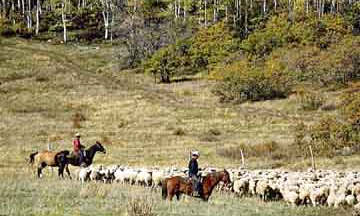

Copyright 2007
LandChoices -
All Rights Reserved
|
Frequently Asked Questions about Preserving Your Land
 How can I protect my land from future development? How can I protect my land from future development?
By working with a nonprofit conservation organization, usually a land trust or land conservancy, you can decide the best conservation tool to use to protect your land. You can select from a number of tools, including the outright donation of your property, the donation or sale of a land preservation agreement that permanently restricts development, the bargain sale of your property, and several other variations.
You should always have legal advice before embarking on such a decision. TOP
We need to sell our land to receive full equity. Is there a way to do this without the land being destroyed by conventional development?
If you are not in a position where you can afford to keep your land and preserve it, or you need the money from the sale of your land for retirement, etc., you can either find a land trust that will help you protect your land and resell it to a conservation minded buyer (often called a "Conservation Buyer" program), protect it with the help of a land trust and sell it yourself.
You can also work with a land trust to protect part of your land and sell the remainder for limited development, or utilize conservation subdivision design where a majority of the land is preserved. TOP
Are there tax benefits associated with land protection?
Yes, there may well be income, estate and property tax benefits for donating your land, donating a land preservation agreement, or selling the property as a "bargain sale" at below market value. The amount and type of tax benefits depends on a variety of factors, including the legal tool you've used to protect you land, the value of the donation, your income level and the total amount of your estate.
A landowner sometimes sells a land preservation agreement, but usually agreements are donated. If the donation benefits the public by permanently protecting important conservation resources and meets other federal tax code requirements--it can qualify as a tax-deductible charitable donation. The amount of the donation is the difference between the land's value with the agreement and its value without the agreement.
Placing a land preservation agreement on your property may also result in a property tax savings. The tax assessment on a property restricted with a land preservation agreement should reflect the land's lowered value after the completion of the land preservation agreement. However, local assessment practices vary. Assessors may not be familiar with land preservation agreements and the landowner may have to apply for a reduction in the assessment.
Again, you should consult with a financial advisor and/or an attorney to fully understand the tax implications. TOP
What is a land preservation agreement (conservation easement)?
 NOTE: We use the term "land preservation agreement", which is the same as a "conservation easement". NOTE: We use the term "land preservation agreement", which is the same as a "conservation easement".
A land preservation agreement (conservation easement) is a voluntary legal agreement between a landowner and a land trust or government agency that permanently limits uses of the land in order to protect its conservation values.
The landowner continues to own the land and the easement does "run with the land" and is binding to future landowners, but the land can be sold or given to heirs just as any other private property. Donating the land preservation agreement may result in reduced income tax and estate tax, and possibly reduced property taxes.
A land preservation agreement can be essential for passing land on to the next generation. By removing the land's development potential, the agreement lowers its market value, which in turn lowers estate tax. Whether the agreement is donated during life or by will, it can make a critical difference in the heirs' ability to keep the land intact.
Public access is NOT a requirement on lands protected with a land preservation agreement (conservation easement). TOP
Why should I grant a land preservation agreement to an organization?
People execute a land preservation agreement because they love their open space land, and want to protect their land from inappropriate development while keeping their private ownership of the property.
Granting a land preservation agreement to a conservation organization that qualifies under the Internal Revenue Code as a "public charity" - which nearly all land trusts do - can yield income and estate tax savings. These conservation organizations have the expertise and experience to work with landowners and ensure that the land will remain as permanent open space. TOP
Are land preservation agreements popular?
Very popular. According to the Land Trust Alliance, a national association representing land trusts since 1982, a record 6.2 million acres are protected through voluntary land preservation agreements. Landowners have found that land preservation agreements can be flexible tools, and yet provide a permanent guarantee that the land won't ever be developed. TOP
 How can a land preservation agreement be tailored to my needs and desires? How can a land preservation agreement be tailored to my needs and desires?
A land preservation agreement restricts development to the degree that is necessary to protect the significant values of that particular property. Sometimes this totally prohibits construction, and sometimes it doesn't.
Landowners and land trusts, working together, can write land preservation agreements that both reflect both the landowner's desires and the need to protect conservation values. Even the most restrictive agreements typically permit landowners to continue such traditional uses of the land as farming and ranching. A land preservation agreement may apply to the entire property or just a portion of the property.
Building envelopes for a homesite (or future homesite for future generations) can be built into the land preservation agreement agreement as long as they do not disrupt the conservation values of the property.
Other things such as hunting and sustainable forestry are often allowed within the terms of a land preservation agreement if this is what the landowner desires. TOP
What steps do I take to write a land preservation agreement?
First, contact a land trust or land conservancy in your community to become acquainted with the organization and the services they can provide. Explore with them the conservation values you want to protect on the land. Discuss with the conservation organization what you want to accomplish, and what development rights you may want to retain.
For example, you may already have one home on your property and want to preserve the right to build another home. That is one provision that must be specifically written into a land preservation agreement. Always consult with other family members regarding a land preservation agreement, and remember that you should consult with your own attorney or financial advisor regarding such a substantial decision. TOP
 How long does a land preservation agreement last? How long does a land preservation agreement last?
Most agreements "run with the land," binding the original owner and all subsequent owners to the agreement's restrictions. Only gifts of perpetual agreements can qualify for income and estate tax benefits. The agreement is recorded at the county or town records office so that all future owners and lenders will learn about the restrictions when they obtain title reports. TOP
Photo courtesy Carl R. Sams II Photography
What are a conservation organization's responsibilities regarding land preservation agreements?
The conservation organization is responsible for enforcing the restrictions that the agreement document spells out. Therefore, the organization monitors the property on a regular basis -- typically once a year - to determine that the property remains in the condition prescribed by the agreement document.
The organization maintains written records of these monitoring visits, which also provide the landowner a chance to keep in touch with the land trust. Many conservation organizations establish endowments and a legal defense fund to provide for long-term stewardship of the agreements they hold. TOP
Can I sell my property if I place a land preservation agreement (conservation easement) on it?
 Yes, you as the landowner retain full ownership of your land. The property is sold with the land preservation agreement attached-it "travels with the land". New landowners are subject to the guidelines and restrictions outlined in the land preservation agreement.TOP Yes, you as the landowner retain full ownership of your land. The property is sold with the land preservation agreement attached-it "travels with the land". New landowners are subject to the guidelines and restrictions outlined in the land preservation agreement.TOP
Can I donate a land preservation agreement (conservation easement) in a will?
If you want to own and control your land during your lifetime, but assure its protection after your death, you can donate it by will. You should make sure the chosen recipient is willing and able to receive the gift. Make it part of your estate plan.
If you are concerned about getting locked in, the advantage of donating a land preservation agreement in a will is that you can always change your mind and remove it from your will. TOP
Can't I just let my children decide what to do with my land?
Too often, situations arise where a landowner trusted their children and for any number of reasons, the children were not able to (due many times to sibling conflicts, each child wanted something different for the land), or would not, follow their parents wishes.
As Boston tax attorney Steve Small, the nation's foremost authority on protecting family lands, says, "If you care about your land, make plans for it." TOP
Can I sell, make an outright donation, or donate my land in a will?
Visit our web page for information on bargain sales and land donations and more. TOP
LandChoices objective is to alert landowners and their families to these choices.
Consult with your own legal and financial advisors.
Parts taken from the Land Trust Alliance, www.lta.org
|
 |








 NOTE: We use the term "land preservation agreement", which is the same as a "conservation easement".
NOTE: We use the term "land preservation agreement", which is the same as a "conservation easement". 

 Yes, you as the landowner retain full ownership of your land. The property is sold with the land preservation agreement attached-it "travels with the land". New landowners are subject to the guidelines and restrictions outlined in the land preservation agreement.
Yes, you as the landowner retain full ownership of your land. The property is sold with the land preservation agreement attached-it "travels with the land". New landowners are subject to the guidelines and restrictions outlined in the land preservation agreement.